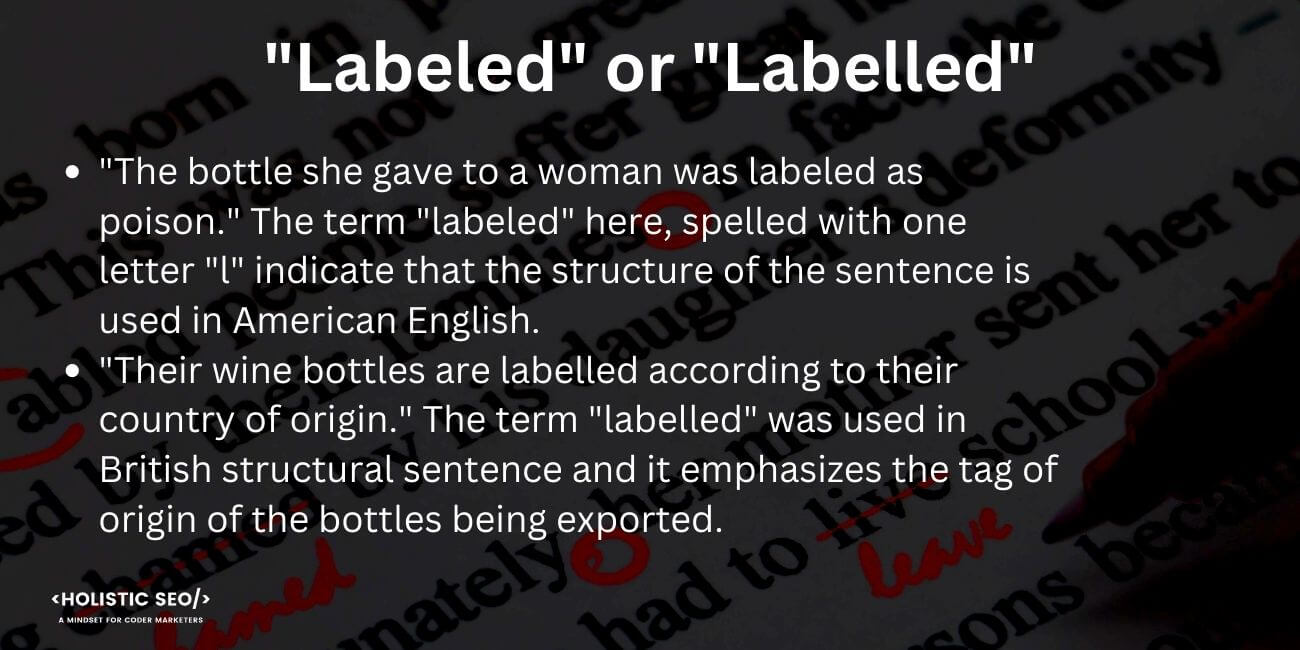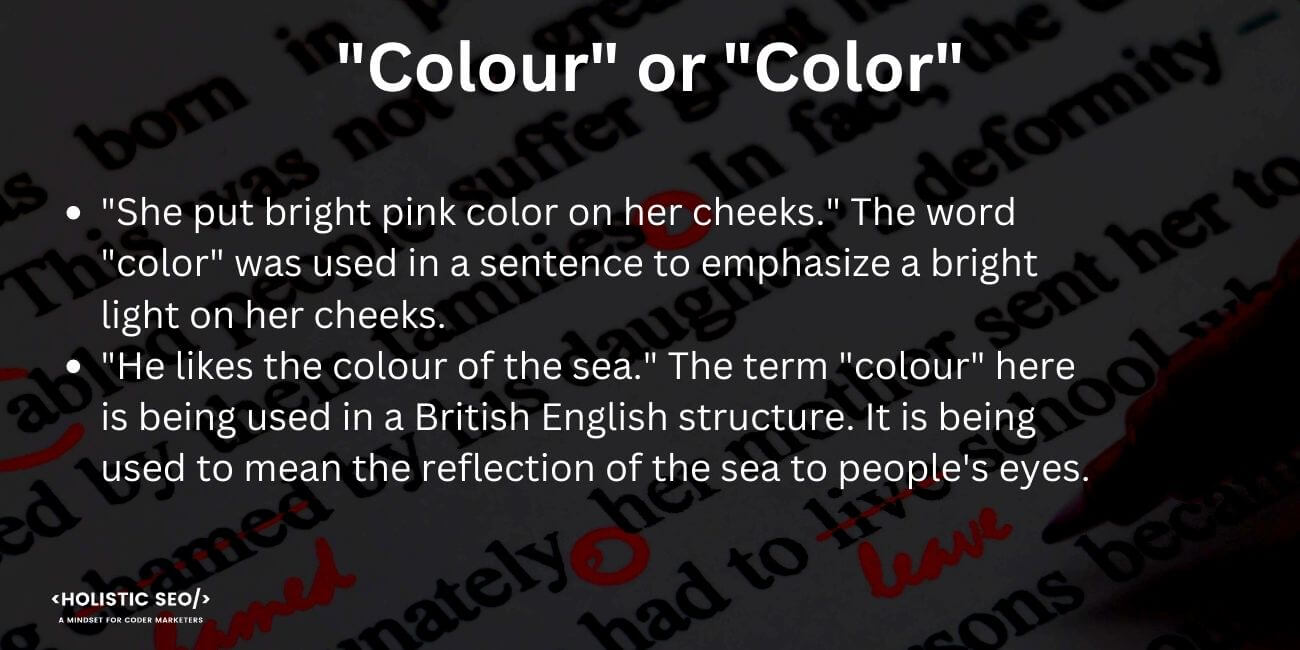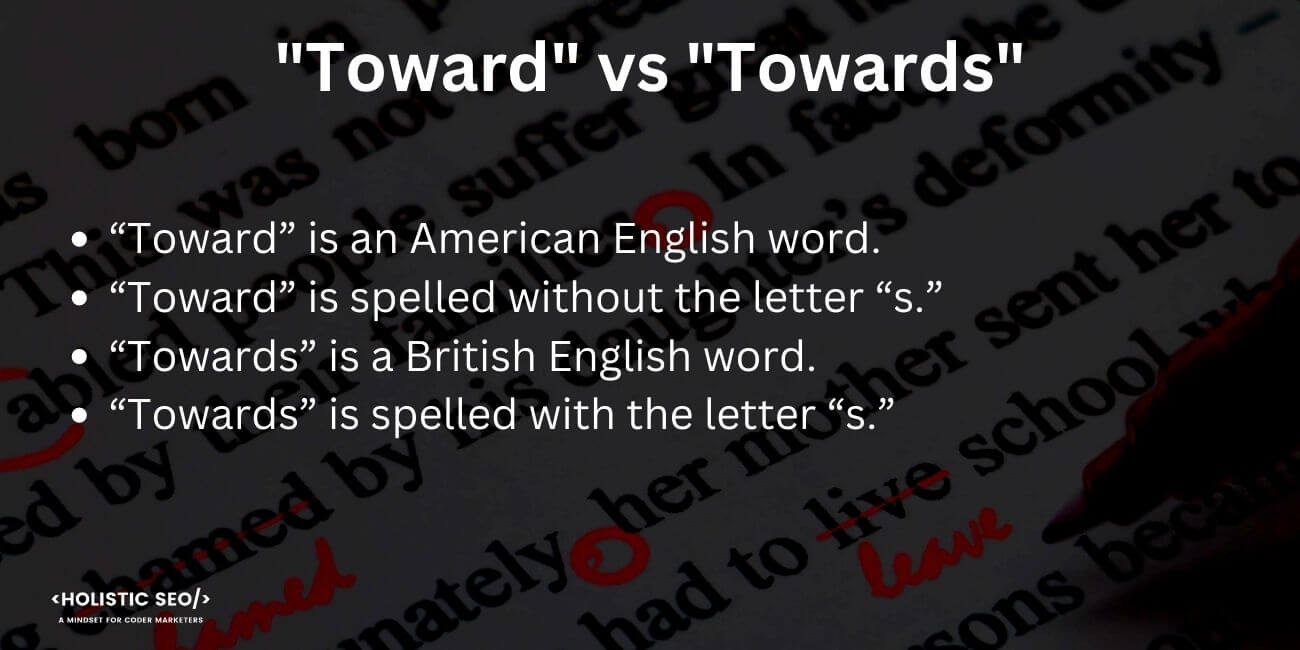The only thing that differentiates the use of the words “labeled” and “labelled” is the particular dialect in which they are spoken. The words “labeled” and “labelled” are the correct ways to spell the word because they both mean the same thing. The terms “labeled” and “labelled” refer to attaching a small piece of paper with additional information to a material, product, or other elements. Moreover, the verb is sometimes used when describing someone’s quality or condition using a specific word or phrase. The spelling “labeled” is the one that is recommended and most commonly used for writing that is intended for American readers. Meanwhile, readers of British English, such as those found in Great Britain and Canada, use the word “labelled” as the preferred and more common form of the spelling. Furthermore, the words “labeled” and “labelled” are both past tenses of the verb “label.” The verb “label” was first derived from the Middle English label (“narrow band, strip of cloth”), from Old French label, lambel (Modern French lambeau), from Frankish *lappā (“torn piece of cloth”), from Proto-Germanic *lappǭ, *lappô (“cloth stuff, rag, scraps, flap, dewlap, lobe, rabbit ear”), from Proto-Indo-European *leb- (“blade”). The terms “labelled” and “labeled” were initially used for the first time in the 14th century. On top of that, the words “labelled” and “labeled” are both used in the same context. Designing the writing so that it makes sense to either American or British readers is crucial because the writer must always keep their audience in mind when they are writing. It is highly inappropriate to use the opposite of a word or to use the words “labeled” and “labelled” interchangeably when writing for readers in the United States or the United Kingdom.
Some example sentences using the word “labeled.”
- The bottle she gave to a woman was labeled as poison.
- Her father was publicly labeled as an abuser.
- He was wrongly labelled a liar.
- Their wine bottles are labelled according to their country of origin.
What is the Difference between Labeled and Labelled?
The main distinction between the words “labelled” and “labeled” is the dialect in which they are used. There are numerous obnoxious spelling differences between both American and British English, frequently occurring between two different versions of the same word. The spelling of the word “labeled” with just one “l” is the most commonly used in American English. Meanwhile, the spelling of the word “labelled” with a double “ll” is the most commonly used in British English. These terms originate from the verb “label,” which means to insert a notice to something, usually paper, on which information is recorded.
Do Labeled and Labelled mean same thing?
Yes, the words “labelled” and “labeled” share the same meaning. They are both the past tense of the verb “label,” which has the meaning of “inscribed and attached to an object for classification or description.” The words “labeled” and “labelled” are used in their respective forms as nouns and verbs. As a noun, it describes a piece of written or printed matter that is included with an object in order to provide classification or other details. Similarly, when it is used as a verb, it makes reference to defining or classifying with or as if with a label. The words ”labeled” and “labelled” are both acceptable spellings in the English language, and both versions of the word “labeled” and “labelled” are acceptable from a grammatical point of view. However, depending on the dialect being used, each word is utilized in a variety of different ways. They more frequently use the word “labeled” in American English, whereas in British English, they more frequently use the word “labelled.”
How to Spell Labeled and Labelled?
The spelling of the words “labeled” and “labelled” is only slightly different from one another. The word “labeled” only needs one “l” in American English. Meanwhile, the word “labelled” in British English must be spelled with a double “ll.” On top of that, when beginning to pick up and learn English, it is absolutely necessary to familiarize oneself with the standard pronunciation and spelling of the language. The most effective strategy is to become familiar with it and explore its phonetics. There is no difference in the pronunciation of the words ”labeled” and “labelled.” The speaker must divide them into two syllables or two sounds to pronounce the words. The words must be pronounced with a combination of the sounds ”LAY” and “BUHLD.” There are some helpful hints that guide the speakers through correctly pronouncing the words. First, the speakers need to record themselves repeating the words ”labeled” and “labeled” in a complete sentence. Next, they must watch the documented session and listen to what was said. It is a helpful trick to be able to mark their own mistakes quite comfortably. Second, if they find that recording themselves saying the words “labelled” and ”labeled” does not help, they must look up guides on how to properly pronounce those words on YouTube. Lastly, they really need to zero in on a single accent. Even though these words are pronounced in the same way, the strategies discussed helped the speakers apply them to other words that have the same meaning but are spelled differently.
How to Use “Labeled” in American English?
It is crucial to keep certain things in mind when using the word “labeled” in American English. The word “labeled” functions either as a verb or a noun, depending on the context. The noun form of the word “labeled” refers to the piece of paper or similar content used to identify and describe an object. It is a term or label that is used for the purpose of classifying a person or thing, particularly one that is incorrect or prohibitive. Meanwhile, when used as a verb, the word ”labeled” means to affix a label to the object that is being discussed. It is the act of putting something into a category, typically in an improper way or one that is overly restrictive. The American English language must be used for American audiences.
Listed below are the example sentences for the word “labeled” in American English.
- The institution was labeled to be the most prestigious of them all.
- The icon button on the keyboard that is labeled “delete” is one of her favorite things to click.
- He labeled her girlfriend as a queen in his phone contact.
- She enjoys giving each item a labeled name.
- They labeled the eggs starting from the smallest to the largest.
How to Use “Labelled” in British English?
Certain factors must be taken into account if the British English word “labeled” is to be used. The word “labeled” functions either as a verb or a noun, depending on the context. The word “labeled” is used as a noun to refer to a little tag or label made of paper or another material that is affixed to an item and provides information about that item. It takes the form of a term or a name that is used to classify a person or thing, particularly one that is erroneous or that places restrictions. Moreover, when used as a verb, the word “labeled” means to affix a label to whatever it is that is being discussed. It is to be placed in a category, typically in an incorrect manner or one that is overly restricted. The British English language must be used for British audiences.
Listed below are the example sentences for the word “labelled.”
- The local newspaper labelled him as a “kid abuser” in its headlines.
- The pharmaceutics labelled the medicines that explained their intended use.
- One of her fellow students labelled her a “thief.”
- They were labelled communists in the gossip magazine.
- She is usually labelled as perfectionist in his classroom.
What are the Common Phrase Combinations of “Labeled” and “Labelled”?
Listed below are the common phrase combinations of “labeled” and “labelled.”
| English Word | Definition | Phrase Combination | Example Sentences of Phrase Combination |
| Labeled | The term “labeled” in American English refers to affixing a label to something when used as a verb. The noun form of the word “labeled” in American English refers to a piece of informational material that is affixed to an item and contains details about that item. | “He/She labeled” “Labeled as” | He labeled his younger brother “playboy.” Her cousin was labeled as a heartbreaker. |
| Labelled | The word “labelled” as a noun refers to a small sheet of paper that is linked to an object and contains information about the thing. The term “centre” in British English refers to labeling something or putting a label on it when used as a verb. | “Labelled as” “He/She labelled” | The fish were labelled as small, medium, large, and extra large. She labelled her mother as an abuser. |
The table demonstrates that there is no difference in meaning between the two ways that the word “labeled” and “labelled” are spelled. The only thing that changes about the way words are spelled is the dialect that is being utilized. The term “labeled” is spelled differently in British English than it is in American English; nonetheless, both versions of the word are pronounced the same. The intended readership determines whether the words “labeled” or “labelled” must be used. The exact spelling of the words “labeled” and “labelled” determines by the demographic profile of the audience for whom the information was created.
What are the Example Uses of “Labeled” in American Publications?
Listed below are the example uses of “labeled” in American publications.
- “As you shop your favorite grocery store, do you lean toward foods that are labeled natural?:” The phrase was from the publication of Michigan State University Extension. The example was all about asking if when someone is doing grocery shopping, they lean towards the foods labeled as “natural.” The release date of the example phrase was during the year 2016.
- “As a concerned citizen and veteran I am profoundly upset that your administration has labeled the American Flag a ‘disruptive symbol,’ Velds wrote:” The phrase is from the publication of Mass Live. The example is all about a concerned citizen and veteran who was upset about the administration that labeled the American Flag as a ‘disruptive symbol.’ The release date of the example phrase was during the year 2017.
What are the Example Uses of “Labelled” in American Publications?
Listed below are the example uses of “labelled” in British publications.
- “A schoolboy has been suspended after a light-hearted video of him rapping was labelled a ‘hate crime’ by teachers.:” The phrase was from a Daily Mail UK publication. The example is about a schoolboy suspended because of the light-hearted video he made, which the teachers labelled as a ‘hate crime.’ the release date of the sentence phrase was 2016.
- “In February, the Sun, which Rupert Murdoch owns, published a story that labelled Prince William “work-shy Wills,” and accused him of “shirking” his royal duties and his job as an air ambulance pilot.:” The phrase was from a Financial Times publication. The example was all about the published story from the Sun’s company owned by Rupert Murdoch which the story labelled Prince William as a “work-shy Wills.” The report accused him of “shirking” his royal duties and his job as an air ambulance pilot. The release date of the sentence phrase was during the year 2016.
When to use the word “Labeled” and “Labelled”?
There are two different interpretations taken with the use of the words “labeled” and “labelled.” To begin, the word must be utilized either as a verb or a noun. The phrases “labeled” and “labelled” are the other conjugation of the words “labels” and “labelling” when used as verbs. The goal of employing the words “labeled” and “labelled” as verbs in a sentence is to imbue something with its name or its function. The words “labelled” and “labeled” must relate to a sheet or a piece of material or fabric that is attached to anything in order to identify or characterize it when the term is used as a noun. However, the usage of the words is different because of the dialects that are being utilized. The word “labeled” is used in American English, but the word “labelled” is used in British English.
How to Use “Labeled” or “Labelled” for Content Marketing?
Content marketers must tailor their use of “labeled” and “labelled” to the characteristics of their target audience. The person responsible for writing the content has the option of selecting a variety of spellings for the words. Only in front of an American English audience is the spelled term “labeled” be used because it is the language that is most often spoken in that country. Meanwhile, the word “labelled” must only be used in British English because that variety of English prefers to spell the word with that particular letter combination. Using these perfectly spelled terms in content marketing ultimately results in a higher rating and greater viewers. Furthermore, having an intimate knowledge of one’s audience and a command of the appropriate linguistics sheds light on unfulfilled requirements. It helps a company shape its product or service and its approach to selling it so that it more closely satisfies the needs of its target market.
How do Accent Differences Affect Search Engine Optimization?
Accents matter in many languages, not just English, and have a big effect on search marketing results. Search results for each potential accent, implying (but not guaranteeing) that the system differentiates between them. However, the rankings are all different, despite the fact that there are some overlaps, with the top places fluctuating less than the lower entries on the first page. Consequently, the algorithm approaches different forms of spelling in a variety of ways. It only indicates that the prospects exist and have an effect on multi-regional SEO for intelligent marketers. Accents are marks that are placed both above, below, or between existing characters in a textual element in the relevant language. The multi-regional SEO guide frequently discuss the significance of accents for search engine algorithms. Furthermore, it is quite important to have a proper accent while writing content for search engine optimization (SEO). Therefore, employing accents for various types of audiences is beneficial in terms of ranking the website or the content in various search engine optimization (SEO) internationally.
What are the Similar Accent Differences such as “Labeled and Labelled”?
Listed below are similar accent differences, such as “labeled“ and “labelled.“
- “Labour” and “labor”: The words “labour“ and “labor“ are similar to the other accent words “labelled“ and “labeled.“ They are similar to the words “labeled“ and “labelled“ because both have the same definitions when used in a sentence, but vary in dialect. There is no difference in meaning between the words “labor” and “labour.” These words are used interchangeably to mean “labor” or “effort.” In contrast, the word “labour” is utilized more frequently in British English, whereas the term “labor” is utilized more frequently in American English.
- “Humour” and “Humor”: The words “humour“ and “humor“ are similar to the other accent words “labelled“ and “labeled.“ They are similar to the words“labelled“ and “labeled“ because both have the same definitions when used in a sentence, but vary in dialect. American English prefers the word “humor,” while British English prefers the word “humour.” The only difference between the words is in their spelling, but they have the same meaning. The capacity to take amusement in one’s surroundings is referred to by both of these terms.
- “Flavour” and “Flavor”: The words “flavour“ and “flavor“ are similar to the other accent words “labelled“ and “labeled.“ They are similar to the words“labeled“ and “labelled“ because both have the same definitions when used in a sentence, but vary in dialect. American English prefers the word “flavor,” although British English uses the word “flavour” more frequently. The term “flavour” is used interchangeably with “flavor” to describe to the sensory impression left by a food or other substance.
- “Neighbour” and “Neighbor”: The words “neighbour“ and “neighbor“ are similar to the other accent words “labeled“ and “labelled.“ They are similar to the words “labeled“ and “labelled“ because both have the same definitions when used in a sentence, but vary in dialect. The “neighbor” and “neighbour” are terms that are used to refer to a person who lives quite close to another person. The word “neighbor” is used more frequently in American English, but the word “neighbour” is used more frequently in British English.
- “Travelled” and “Traveled”: The words “travelled“ and “traveled“ are similar to the other accent words “labelled“ and “labeled.“ They are similar to the words “labeled“ and “labelled“ because both have the same definitions when used in a sentence, but vary in dialect. The “travelled” and “traveled” refer to the same action, hence their meanings are interchangeable. These phrases are used to refer to a trip or a path. The term “travel” is more preferred in American English, whilst the word “travelled” is more popular in British English.
Are the spellings “Labeled” and “Labelled” both correct?
Yes, both “labelled” and “labeled” are acceptable forms of the word in written communication. They have the same meanings because they are both employed in the same context. The only distinction between the two is the particular dialect that each speaks. The writer, however, must keep in mind that the words must be employed in the appropriate linguistic format. The English language spoken in the United States often makes use of the word “labeled.” Meanwhile, the word “labeled” is the one that is utilized more frequently in the British English language.
- 48 Online Shopping and Consumer Behavior Statistics, Facts and Trends - August 22, 2023
- B2B Marketing Statistics - August 22, 2023
- 38 Podcast Statistics, Facts, and Trends - August 22, 2023


